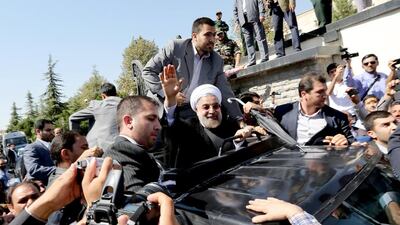ABU DHABI // The events since the start of the Arab Spring have shifted the regional order. Former power brokers Cairo, Damascus and Baghdad have been sidelined as they focus on their internal affairs. Amid the chaos, Saudi Arabia has stepped forward and exercised its strength this year, even if it meant contradicting its strongest Western ally, the United States.
Over the summer, Riyadh took regional leadership of support for the opposition to Syrian president Bashar Al Assad, and along with the UAE and Kuwait offered a combined US$12 billion (Dh44bn) in immediate financial assistance to the military-backed government in Egypt in July.
After winning a United Nations Security Council seat a few months later, Saudi Arabia rejected it in protest against the body’s inaction on Syria and Palestine.
These steps have caused concern in Washington for their assertiveness and because at times they run counter to US policy.
Saudi Arabia’s stance on these issues has even prompted speculation that 2013 could be the beginning of the end of the decades-long US-Saudi alliance.
But the changes ahead are likely less of a break-up and more of a shift in the balance of power within the relationship. While still reliant on the US for weapons, Saudi Arabia is more confident of maintaining its own security.
Riyadh appears poised to expand on this independence to distance its foreign policies from those of Washington, particularly on issues close to home.
What this means on a practical level is that day-to-day cooperation and coordination will likely remain intact, but Riyadh and Washington will agree to differ on big-picture questions such as who to support in Egypt and what a solution should look like in Syria.
For Saudi Arabia, the priority in the coming year is simple: regional stability. Policymakers argue that economies and governments across the region need to consolidate chaotic politics, assure investors and citizens, and foster growth. This explains Riyadh’s investment in the new Egyptian government, its backing of the monarchies in Jordan and Morocco and continued contribution to Bahrain’s economic recovery.
Riyadh also sees an urgent need to contain the fallout from the Syrian conflict. Saudi’s King Abdullah has sent humanitarian aid and other assistance to Jordan and Lebanon, where the magnitude of the refugee influx has stressed already fragile economies and political systems. Sectarian tensions spilling over from the conflict into Iraq, Lebanon, and elsewhere also raise the spectre of more – not less – turmoil.
A goal for stability also explains why Riyadh is sceptical of Tehran, for what it views as undue Iranian influence and even interference in the Middle East. Saudi Arabia and the GCC have often accused Iran of stirring tensions and unrest in the region. Tehran has strongly backed the Assad government and is also allied with the Iraqi prime minister Nouri Al Maliki.
For this reason, Saudi Arabia lobbied against last month’s interim nuclear deal that western powers signed with Iran to curb the Iranian nuclear programme in exchange for relief from sanctions.
Time will tell if a call in September by Iran’s reformist new president, Hassan Rouhani, for closer ties with Riyadh will lead to any improvement in relations between the region’s two dominant powers.
To Riyadh, a stronger GCC will be a bulwark against at least some of this regional turmoil, perhaps even in the form of a Gulf Union.
The proposed grouping, which would be similar to the European Union, would create tighter economic and security cooperation among these countries, which have in common a model of governance that promises economic prosperity and opportunity in exchange for political stability for citizens.
The idea of a Gulf Union recently hit a snag when Youssef bin Alawi, Oman’s foreign minister, said this month that Oman was not interested in participating. A subsequent GCC meeting in Kuwait vowed to continue integration.
Whether Saudi Arabia can achieve the goals it has ambitiously set for itself is now the question of 2014. Qatar in recent years tried a similar push for influence and is now regrouping after a series of setbacks.
Just a year ago, Qatar had placed itself at the centre of nearly every regional foreign-policy question. Doha had carved out a role backing the Islamist-leaning parties and individuals who came to power in Libya, Tunis, Cairo, and among the Syrian rebels. Qatar’s all-in support, however, may also have been a miscalculation.
Today, Qatar’s role has won it broad public distrust in Egypt and Libya. Some of Qatar’s allies in the Syrian opposition have meanwhile been sidelined in the western-backed opposition Syrian National Coalition.
Saudi Arabia is bigger, richer, and home to Islam’s most sacred sites. Expect Riyadh to leverage all those assets in pursuit of its increasingly assertive foreign policy goals.
edickinson@thenational.ae

